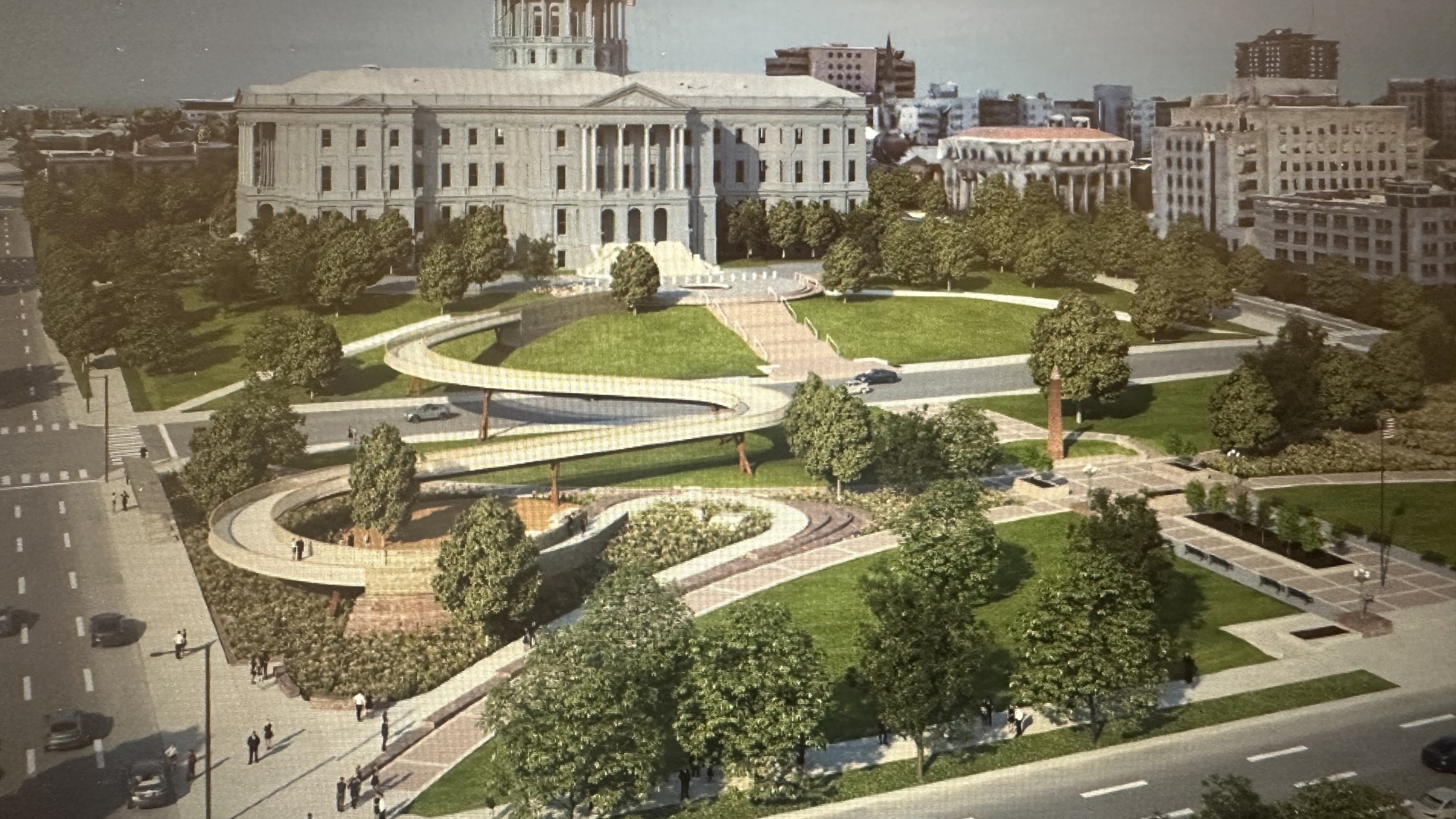CURRENT ISSUES
Lincoln Street Pedestrian Overpass
A Park at the Center of the City
Civic Center Park is not just a downtown green space—it is the civic and symbolic heart of Colorado. Designed and developed over more than three decades beginning in the 1890s, it represents a rare and nationally significant example of Beaux-Arts planning, the City Beautiful movement, and democratic symbolism in urban form. The State Capitol, Lincoln Veterans Memorial Park, and Civic Center Park are united by formal order, axial symmetry, and monumental views that reflect a tradition of American civic design rooted in classical ideals.
This ensemble was designated a National Historic Landmark (NHL) in 2012, recognized for its “continuum of progressive thought about civic betterment, regional character, and public architecture.” The Capitol itself was intentionally placed atop a hill with a westward slope that opens toward the Rocky Mountains, framed by terraces and lawns to emphasize “the refined proportions and restrained elegance of the statehouse… a noble citadel when viewed from afar.” These are not arbitrary features—they are expressions of purpose, continuity, and unity.
A Proposed Intervention
In early 2025, the state released concept renderings for an elevated pedestrian overpass across Lincoln Street, connecting the Capitol to Lincoln Veterans Memorial Park as part of the Colorado 150 and America 250 commemorations. Estimated to cost between $18–20 million in public-private funds, the project has been framed as an artistic and symbolic connector—yet its form, location, and function directly conflict with the Civic Center’s historic purpose and federally recognized design guidelines.
Since that time, the project has continued to advance. In June 2025, the State formally filed an encroachment permit with the City and County of Denver to begin the approval process. The proposal is also scheduled as an action item at the Capitol Building Advisory Committee meeting on June 26, 2025, at 1:30 PM, where public comment will be accepted. These new steps underscore the urgency of public engagement and the real threat this project poses to Civic Center Park’s historic fabric.
Historic Denver has formally opposed the proposed structure. We have tracked this project since August 2024, raising initial concerns in March 2025 and issuing formal opposition on May 5 after seeing the proposed design. In our letter to the America 250 – Colorado 150 Commission, we outlined nine core concerns, grounded in the district’s designation documents, Denver’s Civic Center Design Guidelines, and the 2019 Cultural Landscape Report for the Capitol Grounds. These concerns include not only issues of visual intrusion and symbolic disruption, but also serious questions about pedestrian logic, civic safety, and the cumulative impact on public trust.
Why it Matters
Beaux-Arts civic design values clarity, processional order, and open views. The proposed overpass—curving, elevated, and dominant in form—undermines these principles. It would:
- Obstruct sweeping westward views from Colfax Avenue and Capitol Hill toward the mountains
- Disrupt axial alignment that defines how people experience this civic landscape
- Diminish symbolic clarity by shifting attention away from the Capitol’s formal presence
- Alter the historic topography of Brown’s Bluff, a defining feature of the Capitol’s setting
- Visually overwhelm historic features, including the Medal of Honor monument, which would be displaced to make way for the structure
Furthermore, despite being framed as a public safety improvement, the overpass does not align with pedestrian desire lines. Most pedestrians cross Lincoln at Colfax or 14th Avenue. Asking them to detour significantly—especially in winter or in civic moments—raises concerns about whether the bridge will be used at all. Elevated overpasses in cities like Minneapolis and Cincinnati have already been removed due to underuse, safety issues, and their negative impact on street-level vitality.
Additional Concerns
- Civic Protest & Public Safety: The Capitol’s west lawn is a common site of public protest. A raised walkway over Lincoln could facilitate the hanging of banners or objects, introducing new risks to vehicles and pedestrians below.
- Disruption Fatigue: With simultaneous projects already underway—the 16th Street Mall overhaul, Colfax Bus Rapid Transit, and Civic Center park upgrades—residents and workers are already experiencing disruption. A new overpass would add another layer of construction fatigue and visual clutter, in a place meant to symbolize unity and transparency.
- Policy Conflicts: The proposed design directly contradicts Denver Civic Center Design Guidelines, which call for compatibility with axial composition and formal character. The 2019 Cultural Landscape Report also urges that any new feature be “subordinate to and compatible with the mass, scale, form, and character” of the setting. The proposed overpass meets none of these requirements.
Historic Denver’s Position
Since August 2024, Historic Denver has actively monitored this project, attending briefings and engaging stakeholders. We first raised concerns in principle on March 31, 2025, citing potential conflicts with the Civic Center’s historic fabric. When design renderings were released in late April, we submitted a formal letter of opposition on May 5, 2025, outlining nine specific areas of concern. This advocacy has been informed by our Preservation Committee and reflects our deep, ongoing commitment to Civic Center’s protection.
Historic Denver supports creative and inclusive ways to commemorate Colorado’s 150th and the nation’s 250th birthdays. But such milestones must be celebrated with care—especially when they intersect with places of such cultural and symbolic gravity. We believe meaningful commemoration can be achieved through:
- Interpretive art and temporary installations
- At-grade safety enhancements
- Celebratory programming that engages the public without physically altering the space
We remain committed to dialogue and collaboration, and we welcome conversations about alternative ways to honor this moment in our shared history.
“Plowing a functionally useless bridge through this historic site serves no purpose but does extensive damage,” said John Deffenbaugh, President & CEO of Historic Denver. “We urge the Landmark Preservation Commission and the public to oppose this wasteful proposal and instead support safer, more pedestrian-friendly improvements at street level.”
Click HERE to read our full press release in opposition to this project.
Background
The “Colorado 150 Pedestrian Walkway” is a proposed public-private project led by the America 250 – Colorado 150 Commission, with the design team at Studio Gang and support from History Colorado. The overpass would span Lincoln Street, with a potential future phase extending over Broadway. Construction is expected to cost up to $20 million. Final approvals will be reviewed by the State Historic Preservation Office (SHPO), the Capitol Development Committee, and Denver’s Landmark Preservation Commission.
In The Press
Denver Post: Capitol Walkway Project Draws Public Debate
Denver Post: Do we really need a $20 million walkway from the Capitol to a park?
The Independent: Colorado Residents Fume Over Denver’s $20M Pedestrian Bridge: “Who is this for?”
KDVR FOX31: Historic Denver Calls Proposed Lincoln Street Walkway ‘wasteful,’ ‘functionally useless’
KDVR FOX31: Potential walkway to Colorado Capitol facing pushback
KWGN Channel 2: The state wants a “Bridge to nowhere” at a cost of 20 million.
Get Involved
Click HERE to sign the petition opposing the Lincoln Street Overpass!
Historic Denver has protected places like Civic Center Park for more than 50 years—help us ensure it remains a place of dignity, openness, and civic meaning for the next generation. Your membership supports Historic Denver’s daily work to advocate for the places that shape our identity.
Become a member today to help us protect the Civic Center and other treasured historic spaces.
Updated June 2025

